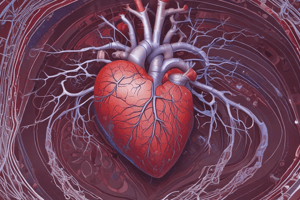Podcast
Questions and Answers
What is the main consequence of the coronary arteries becoming blocked with fatty material?
What is the main consequence of the coronary arteries becoming blocked with fatty material?
- The heart receives less oxygen (correct)
- The heart starts to pump more blood
- The heart valves become damaged
- The blood vessels start to leak
What is a potential risk of using stents to keep the arteries open?
What is a potential risk of using stents to keep the arteries open?
- The stent will move to another part of the artery
- Blood clots can form near the stent (correct)
- The stent will reduce the levels of HDL cholesterol
- The stent will dissolve over time
What is the benefit of statins in reducing the risk of coronary heart disease?
What is the benefit of statins in reducing the risk of coronary heart disease?
- They increase the levels of LDL cholesterol
- They decrease the levels of LDL cholesterol (correct)
- They decrease the levels of HDL cholesterol
- They have no effect on cholesterol levels
What is a potential problem with faulty heart valves?
What is a potential problem with faulty heart valves?
What is a common issue with taking statins as a solution to coronary heart disease?
What is a common issue with taking statins as a solution to coronary heart disease?
What is a limitation of replacing a heart valve with a biological valve?
What is a limitation of replacing a heart valve with a biological valve?
What is a potential risk of using a mechanical heart valve?
What is a potential risk of using a mechanical heart valve?
What is a benefit of using an artificial blood solution?
What is a benefit of using an artificial blood solution?
Why may an artificial heart be used whilst waiting for a heart transplant?
Why may an artificial heart be used whilst waiting for a heart transplant?
What is a potential complication of heart surgery?
What is a potential complication of heart surgery?
Flashcards are hidden until you start studying
Study Notes
Coronary Heart Disease
- Coronary heart disease occurs when coronary arteries become blocked with fatty material, reducing blood flow and oxygen supply to the heart, leading to heart attacks.
Treatment: Stents
- Stents are metal mesh tubes inserted in arteries to keep them open and allow blood to flow through.
- Advantages: effective in lowering heart attack risk, quick recovery time from surgery.
- Disadvantages: risk of heart attack during procedure, infection, and blood clot formation near the stent.
Treatment: Statins
- Statins are drugs that decrease LDL (bad) cholesterol levels, reducing the risk of strokes, coronary heart disease, and heart attacks.
- Advantages: increase HDL (good) cholesterol levels.
- Disadvantages: require continuous use, may produce side effects, and may not have an immediate effect.
Heart Valve Problems
- Faulty heart valves can lead to inefficient heart function due to stiffness or damage, causing blood to flow in the wrong direction.
- Solution: replacing faulty valves with biological or mechanical valves.
- Biological valve: works well, lasts 12-15 years.
- Mechanical valve: lasts long, requires constant medication to prevent blood clotting.
Heart Failure
- Heart transplant is a solution, but donor hearts are not always available.
- Artificial hearts can be used temporarily, but may have limitations (infection risk, mechanical parts wear out, blood clots).
Artificial Blood
- Artificial blood is a salt solution that can keep patients alive even if they lose 2/3 of their red blood cells.
- Advantage: gives time to produce new blood cells.
- Disadvantage: can only be used for short periods, then a blood transfusion is necessary.
Studying That Suits You
Use AI to generate personalized quizzes and flashcards to suit your learning preferences.





